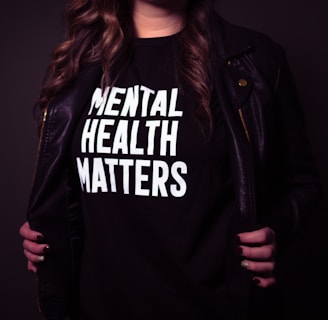Understanding and Tackling Mental Health Stigma [Updated 2024]
Mental health stigma continues to hold back many from seeking the help they need. It's a barrier that undermines the individual's well-being and festers in our communities. Often ignited by misinformation and outdated stereotypes, this stigma manifests as fear, shame, and discrimination, making it hard for people to admit their struggles. This post seeks to dismantle these misconceptions by exposing their roots and impacts. Understanding what stigma is and how it affects you or someone you love is the first step in breaking down these barriers and fostering awareness, empathy, and action. Together, we can create a more open conversation about mental health.
BIPOLARDEPRESSIONBINGE EATINGANXIETYADHDTRAUMA
Medically Reviewed By Chelsey Lahr, PMHNP-BC
10/17/20247 min read


Understanding Mental Health Stigma
Mental health stigma is like an invisible barrier that stops people from getting the help they need. It’s a shadow that follows those struggling with mental health issues, creating misunderstandings and fear. Rather than being a rare problem, stigma affects many, making it a topic that needs more attention and understanding.
Defining Mental Health Stigma
Mental health stigma refers to the negative attitudes and beliefs that society holds about people who have mental health issues. Think of it as the unspoken rules that say it's okay to judge or avoid someone because of their mental state. This stigma can lead to discrimination and prejudice, making individuals feel isolated or ashamed and even preventing them from seeking help.
The harm caused by stigma is profound. It can change how people see themselves, leading to self-doubt and worsening mental health conditions. The Mayo Clinic explains that stigma can deter people from reaching out for support or talking about their issues with others. Understanding stigma is the first step in breaking down these barriers.
Types of Stigma
Stigma isn't just a single form that affects everyone the same way. It comes in different types, each with its own impact and challenges.
Public Stigma: This is the most visible type, where society at large holds discriminatory attitudes towards people with mental illness. Public stigma is like a loud voice that echoes negative stereotypes, which can be seen in the media, workplaces, and everyday interactions. The American Psychiatric Association notes that public stigma can lead to lost opportunities and increased suffering.
Self-Stigma: This occurs when individuals internalize these public attitudes, believing that the negative views are true about themselves. It's like carrying a mirror that only shows the faults others project on them. Self-stigma can result in lowered self-esteem and increased psychological distress, making recovery even harder.
Institutional Stigma: This type is less obvious but just as pervasive. It includes the policies of governments and organizations that unintentionally limit opportunities and resources for individuals with mental health issues. Imagine rules that make it harder to access mental health care, like complicated insurance coverage or lack of funding for programs.
Recognizing these types is crucial for understanding how deeply stigma is woven into society. Each type affects people differently, but all contribute to the barriers faced by those with mental health challenges. By learning about these types, we can better support those in need and work towards eliminating stigma altogether.
The Impact of Stigma on Mental Health
Stigma is more than just a word; it's a powerful barrier that blocks many people from getting the help they need for mental health issues. It creates a wall of shame and misunderstanding, making it harder for individuals to talk openly about their struggles. But how deep does this impact go, and what are the real consequences for those affected by mental health stigma? Let's break it down.
Barriers to Seeking Help
Stigma often acts like an invisible hand, holding people back from reaching out for mental health support. Many fear being labeled as "crazy" or "broken" if they admit they need help. This fear can be as paralyzing as the mental health issues themselves. People might worry about being judged by friends, family, or even their employers.
Fear of Judgment: Worrying about what others might think is a huge factor. When society labels mental health issues negatively, it drives silence.
Misunderstandings: Many believe myths over facts. They might think mental health problems are rare or see them as character flaws rather than real illnesses.
Lack of Awareness: Sometimes, people just don't recognize their own symptoms or hesitate because they think they should handle it alone.
For a comprehensive look at how stigma creates barriers, Better Health offers insights into preventing access to necessary care.
Effects on Recovery
Recovery from mental health conditions is tough enough without the added burden of stigma. Stigma can actually worsen the condition by making individuals feel isolated and unsupported. It can increase stress and make symptoms more severe, trapping people in a cycle that feels impossible to break.
Isolation: Feeling isolated can worsen depression and anxiety as social connections are crucial for recovery.
Reduced Quality of Life: Being stigmatized affects how people see themselves. It can lead to low self-esteem, making it harder to believe in recovery.
Delayed Treatment: The longer someone waits, often due to stigma, the harder it gets to treat their conditions effectively.
Understanding the real impact of stigma is crucial for everyone. By talking about it, we can help tear down the barriers that prevent so many from seeking the help they need.
Cultural Perspectives on Mental Health Stigma
Mental health stigma is like an invisible wall, separating people from getting the support they need. But did you know that this wall looks different depending on where you are in the world? How people perceive mental health can vary widely across different cultures. In this section, we'll explore how stigma unfolds in diverse communities and how cultural beliefs and values shape these views.
Stigma in Diverse Communities
Mental health stigma doesn't wear the same clothes in every culture. In some communities, talking about mental health can feel like a taboo, shrouded in whispers and judgment. In Asian cultures, for instance, stigma is particularly severe, often linking mental illness to shame and family dishonor. This makes acknowledging mental health issues difficult, sometimes even impacting aspects like marriage prospects.
In African American and Hispanic communities, there's often pressure to be tough—showing vulnerability might be seen as a weakness. People might ask why you can't just "snap out of it," which can keep many from seeking help. Likewise, Native communities can view admitting to mental health struggles as private family matters, not something to be shared outside.
Ultimately, stigma can be a silent giant in many cultural contexts, preventing people from stepping out and getting the help they need. Understanding these diverse perspectives is vital in breaking down those barriers.
Cultural Norms and Values
Cultural beliefs and norms are like lenses influencing how we see mental health. In some cultures, emotional well-being is deeply tied to spiritual beliefs. For instance, in some parts of India, mental disease might be seen as a result of past-life sins or spiritual imbalance, prompting people to seek healing through spiritual means rather than professional help.
Family reputation and honor often hold weight in many Asian and Middle Eastern cultures. Here, it's not just about the individual; it's about how their condition might reflect on the family's standing in the community.
Meanwhile, Western cultures often prioritize individual achievement and independence, which can lead to the belief that one should handle their issues alone. This sometimes translates into a quiet struggle, where seeking help is equated with failing to manage one's own life.
Culturally ingrained values heavily influence how mental health is perceived. These cultural tapestries can shape whether people feel supported or stigmatized. By recognizing these differences, we can work towards fostering more inclusive perspectives on mental health care. For a detailed examination of these cultural influences, you can explore more about cultural stigma impacts.
Understanding cultural perspectives is akin to putting on a new pair of glasses; it lets us see mental health stigma in a whole new light. By embracing these views, we can work together to dismantle the invisible walls of stigma in every corner of the world.
Strategies to Reduce Mental Health Stigma
Breaking down mental health stigma requires a collective effort. Whether it's learning more about mental health, talking openly, or showing empathy, each step we take can make a difference. Here are some practical strategies to help reduce mental stigma in our communities.
Education and Awareness
Educating the public about mental health is crucial. When people understand mental health conditions better, they often become more compassionate and less judgmental.
Learn and Share: By learning about mental health through reliable resources, you can share facts and dispel myths.
In Schools: Teaching students about mental health can save lives and reduce stigma.
Awareness Campaigns: Supporting campaigns that spread accurate information helps create a more informed public.
These efforts create a ripple effect, encouraging a culture of understanding where everyone feels supported.
Promoting Open Conversations
Normalizing discussions around mental health is one way to silence stigma. If we talk freely about mental health like we do about physical health, it becomes less stigmatized.
Start the Conversation: Talking openly about mental health empowers others to share their experiences.
Encourage Others: Encourage your friends and family to discuss mental health regularly.
Create Safe Spaces: Cultivate environments at home, work, or school where people feel safe to express their feelings.
These conversations reduce the mystery and misinformation surrounding mental health, making it an everyday topic.
Empathy and Support
Empathy is a powerful tool in reducing stigma. When we empathize with others, we connect on a human level, understanding their experiences without judgment.
Listen Actively: Listening without judging can provide immense support to someone experiencing mental health issues.
Advocate for Equality: Treat mental health with the same seriousness as physical health, promoting equality between the two.
Support Networks: Join or form support groups where individuals can share experiences and advice.
Showing empathy and offering support helps create a more inclusive and understanding community, breaking down walls of stigma and fostering acceptance.
Success Stories in Overcoming Stigma
Mental health stigma can feel like a massive wall, blocking out the support and compassion one needs. But many individuals and communities have found ways to break down these barriers. Let's explore some inspiring personal accounts and community initiatives that have been successful in overcoming stigma.
Community Initiatives: Showcase Community Programs That Have Successfully Challenged Stigma
Community programs are like gardens where stigma is weeded out, truth and understanding are planted, and compassion blooms. Here are some initiatives that have achieved remarkable success:
Stand Against Stigma Movement: This initiative aims to eliminate all stigma associated with mental illness and substance use disorders. Resources and campaigns through Stand Against Stigma offer communities the tools needed to foster supportive environments.
Stigma-Free Society Programs: Programs offered by the Stigma-Free Mental Health Society focus on educating communities to build awareness and acceptance, promoting mental health without judgment.
Mental Health Commission of Canada: The Breaking the Stigma Initiative emphasizes storytelling to create a ripple effect of understanding, gradually dismantling the stigma piece by piece.
By engaging in these community-driven efforts, barriers to mental health understanding and acceptance can be broken down, one initiative at a time. These programs act as catalysts, sparking change and fostering environments where stigma can no longer thrive.
Conclusion
Challenging mental health stigmas requires us to rethink entrenched societal views. Empathy and education open doors to understanding. It's time to support change and affirm that mental health matters as much as physical health.
You have the power to break these barriers. Talk, listen, and educate. Stand against stigma by fostering conversations.
Courageously support those in need. Share your story. Encourage openness.
Providing compassionate holistic mental health care to Colorado and Arizona.
Phone: Colorado 719-505-4404 | Arizona 623-263-3590
Copyright © 2018-2024 Intrepid Mental Wellness, PLLC. All rights reserved | Privacy Policy | Terms & Conditions


Content on this website is not considered medical advice. Please consult with a licensed health care provider before making any medical or lifestyle changes.
Holistic mind & body supplements & products
Contact |
Shop |
Fax: 720-899-3575